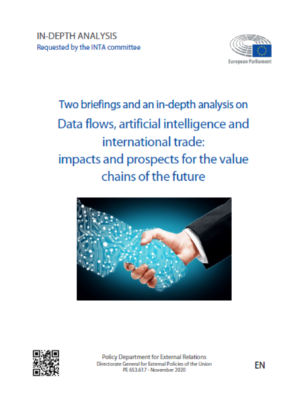External Publication
Data flows, artificial intelligence and international trade: impacts and prospects for the value chains of the future
In-depth briefing and analysis on the issues of digital trade and the geopolitics of trade provided to the European Parliament.
This study was prepared for the European Parliament’s Committee on International Trade (INTA). The study is available on the European Parliament’s online database, ‘ThinkTank‘. Copyright remains with the European Parliament at all times.
On November 26 2020, the European Parliament published a paper requested by the European Parliament’s Committee on International Trade (INTA), in which Bruegel scholars Georgios Petropoulos (Senior fellow), Niclas Poitiers (Research fellow) and André Sapir (Senior fellow) provided both an in-depth briefing and analysis on the issues of digital trade and the geopolitics of trade. This follows a discussion and testimony given November 9 2020 before MEPs at the webinar entitled ‘Data flows, artificial intelligence and international trade: impacts and prospects for the value chains of the future’.
Socio-economic effects of digital trade and artificial intelligence on EU industries
Artificial intelligence and new digital technologies are transforming digital trade. They facilitate the development of new business models of trade and reduce the geographical barriers of economic transactions. Such transformations are quite useful for the small and medium enterprises. Artificial intelligence is being adopted by both digital and non-digital sectors, but its adoption varies a great deal across countries, including within the EU. Data and information flow play a crucial role in digital trade by allowing personalization.
Digital trade is not new, but it is taking new forms that are ushering a new phase of globalisation. So far digital trade mainly affected trade in goods, including through global value chains, though some service activities have already become more tradeable thanks to digital technologies. The new phase of globalisation driven by artificial intelligence and new digital technologies is likely to do for services what the previous phase did for manufacturing: to vastly increase trade between advanced and emerging economies. This prospect raises important issues for domestic policies and trade policy.
Geopolitical Aspects of Digital Trade
This in-depth analysis discusses issues in trade in digitally deliverable services and the geopolitics of digital trade policy. Digitally deliverable services are becoming increasingly important for global value chains, both in terms of final products exported to other countries, and in terms of inputs embedded in manufactured goods. To harness the potential of digital trade in services, both the regulation of the digital means by which a service is traded and the regulation of the services themselves have to be accommodative. Digital trade policy is still in its infancy, and many challenges in terms of policy and measurement remain. Looking at regulation of data flows, the EU’s focus on privacy policy is incompatible with the laissez-faire approach pursued by the US administration and the political control of the internet by the Chinese government, limiting the potential for trade in digitally deliverable services and plurilateral agreements on digital trade. However, a number of other major economies are following similar approaches to the EU, which creates the potential for cooperation and intensifying trade in digital services. The EU should also increase its competitiveness in this strategically important services sector by completing the single market with respect to services and capital, and by strengthening research and development in digital technologies.







